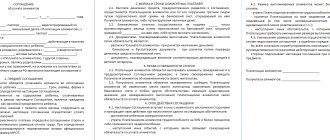The responsibility of parents to raise and feed their children is not only formal, but also legal, since this is precisely the requirement enshrined in the current Russian legislation. In the event that one of the parents left the family due to a divorce from his wife, this obligation is not removed from him.
Only the form of child support changes. Now the separated parent must provide the child with financial support by regularly sending him sums of money, the amount of which is fixed either orally or in writing (in a child support agreement or in a court decision).
However, it is important to note that this fixed amount is not final. Art. 81 clause 2, 119 of the Family Code allows for its change in any direction and even the complete abolition of these payments.
Reasons
The main reason for changing the method of receiving alimony is a change in financial or family circumstances (Article 119 of the RF IC). There is no explanation in the law of exactly what events are included here and how significant they should be. Therefore, the evidence presented by the parties plays an important role. In the case of the recipient, this is the appearance of additional expenses associated with the child’s illness, the need for additional education, tutor services, etc.
Article 119 of the RF IC - Changing the amount of alimony established by the court and exemption from paying alimony
- If, in the absence of an agreement on the payment of alimony, after the amount of alimony has been established in court, the financial or marital status of one of the parties has changed, the court has the right, at the request of either party, to change the established amount of alimony or to exempt the person obliged to pay alimony from paying it. When changing the amount of alimony or when releasing it from payment, the court also has the right to take into account other noteworthy interests of the parties.
- The court has the right to refuse to collect alimony from an adult capable person if it is established that he has committed an intentional crime against the person obligated to pay alimony or in the event of unworthy behavior of an adult capable person in the family.
Expert commentary
Leonov Victor
Lawyer
Sometimes expenses remain at the same level, but due to the deterioration of the parent’s material well-being, he can no longer provide a decent standard of living for the child on his own. For example, a woman previously received a good salary, so she did not need additional funds from her spouse and was satisfied with small alimony. Then she lost her job, and her own income was no longer enough to buy the things her child needed. Or she learned that the payer’s financial situation has improved. For example, he was previously unemployed and paid alimony in a fixed amount in the amount of 1/2 of the regional subsistence level. Now he got a job and can allocate more money to support the child.
The payer also has grounds to request a change in the payment method. This is usually due to:
- deterioration in financial well-being due to job loss;
- wage cuts;
- serious illness;
- emergence of other dependents;
- force majeure (major theft, fire, etc.).
In this regard, it is no longer possible to pay alimony in the previous amount. To prevent debt from accumulating, it is more advisable to ask to change the collection method or reduce the amount of payments.
Is it possible to change the method and procedure for withholding alimony?
Content
Changes in the collection of alimony are allowed:
- When concluding an agreement. A mandatory condition for the validity of the contract is its notarization. Oral and written agreements without the participation of a notary have no legal force and are not enforceable by the parties. Each change and addition to the agreement must be officially certified by a notary.
- When a court makes a decision on the declared dispute and satisfies the applicant’s demands. The court, based on the arguments of the parties, may change the procedure for withholding alimony payments. Decision making is based on the interests of the child. The deterioration of the payer's financial situation is not a valid reason for making such changes.
The legislation does not establish a separate provision regarding changes in the procedure for fulfilling alimony obligations, but in the event of going to court or concluding a voluntary agreement, the parties can refer to the provisions of Art. 119 RF IC.
Provisions of Art. 119 of the RF IC establishes the rights of the parties to change the amount of alimony payments, which indirectly makes it possible to change the procedure for withholding them if the rights of the child when receiving alimony in the established way are violated.
Types of change
According to the Family Code, alimony is withheld either as a share of income or as a fixed amount. In practice, the priority is to assign payments in equity terms. This method is convenient for calculation and quite objective.
Payments in a fixed amount are assigned (Article 83 of the RF IC):
- if the payer does not have a permanent source of income, earnings are irregular or their size varies greatly;
- if the salary is paid in foreign currency or in kind;
- There are several children in a family, and after a divorce, at least one child remains with each parent. In this case, alimony is withheld in a fixed amount in favor of the less wealthy spouse;
- in other cases, when it is impossible to calculate alimony as a share of income or such payments significantly violate the interests of one of the parties. For example, the payer is registered with the employment service, alimony in the amount of ¼ of the income is negligible and does not cover the needs of the child.
Expert commentary
Shadrin Alexey
Lawyer
When filing a claim, you will need to justify the reasons for the changes. If the plaintiff asks to change payments from equity to a fixed amount, indicate the desired amount of alimony.
Methods for collecting funds for a child under the RF IC
Current or former spouses always have several ways to resolve the issue of providing for minors in the family. If there has been no divorce and both parties conscientiously fulfill their responsibilities as parents, then no questions usually arise.
As practice shows, in Russia they most often resort to the compulsory method, since it is not possible to determine the procedure and volume of alimony payments in a civilized manner.
Voluntarily
First of all, the child’s parents need to try to agree on the procedure and amount of child support payment peacefully.
To do this, you should discuss all the details, come to an agreement and secure it in written notarial form. A document drawn up with a notary’s certification will become the basis for observing the rights of each parent and confirming the fulfillment of his obligations to the child.
Executing this option will not take much time, and the only documents needed are the parties’ passports and the child’s birth certificate.
Forcibly
The second option involves filing a statement of claim in court; it is applicable in several situations:
- the parties did not agree peacefully;
- The agreement is signed by the notary, but is not executed at all or not in full.
There is nothing left to do but resort to a judicial process, as a result of which a decision is made on the procedure and amount of alimony for the maintenance of a minor child.
In Russian practice, forced collection, unfortunately, is much more popular than a peaceful solution to the problem of alimony.
Changing the method of transferring money
When a plaintiff or payer wants to change the method of transferring money, this usually does not require going to court. It is enough for the parties to agree among themselves or approach the bailiff leading the case.
For example, previously a woman received money on a bank card. After some time, she moved to the countryside, where there are no branches of this bank. In this case, she can go to the bailiff and write an application to change the transfer method to a postal transfer. He will transfer the necessary information to the accounting department at the place of work of the ex-spouse, and starting next month the money will begin to be transferred in a different way.
It is possible to change the option of transferring money at the initiative of the payer, but it must be borne in mind that the final word remains with the recipient, who can insist on an option that is convenient for him. An exception is if there is evidence of misuse of funds by the claimant (he spends money not on the child, but on himself or on a child from another marriage). In this case, the ex-spouse can ask to change the order of payments and have half of the alimony transferred to the child’s personal account.
When alimony is withheld by agreement, an addition to it is drawn up and certified by a notary. If the second spouse does not agree to this, you will have to ask for a change in the payment method in court.
In what cases does the method of withholding alimony change?
Any party can initiate a change in the procedure for fulfilling alimony obligations. Regardless of the initiator, when making a decision, the court will take into account the various life circumstances of the child’s guardian and the payer of the funds.
When making changes in court, the following are taken into account:
- the financial situation of each of the parties, the current and changed amount of payments in favor of the minor is studied, the results obtained should not violate the rights of the child;
- the marital status of the parties, if a child appears in the payer’s family, then the method of collecting funds for the first child changes based on the rights of the second child to receive payments;
- the presence of children from other marriages of each party and the degree of their participation in the lives of other children;
- presence of adult dependents: parents, disabled children, grandparents;
- the general health of each party, on which the earning potential depends, as well as the health of the child;
- availability of official work, the amount of earnings of the mother and father.
If the financial situation worsens, one of the parties has the right to submit a statement of claim to review the method of withholding alimony. The court has the right to refuse to satisfy the claim of the payer in case of loss of work or income, based on a review of the judicial practice of the RF Armed Forces in 2020.
Loss of a job and deterioration of financial situation due to dismissal are not grounds for changing the amount of alimony deductions or the procedure for collecting them.
Changing the child support agreement
When the amount and procedure for alimony payments are determined by voluntary agreement between spouses, the possibility and procedure for making changes can be specified in the document itself. If the spouses did not provide for this option, but both agree to adjust the previous agreements, everything is resolved simply. All you have to do is go to a notary and make changes to it. Or enter into a new agreement - in this case, the previous document will no longer be valid.
If the decision to change the method of collection is unilateral, and the other party does not agree with it, the issue can only be resolved in court. To do this, the interested party files a claim with a request to change the payment procedure due to new circumstances. You can ask to change the payment method - from a fixed amount to a fractional amount and vice versa. You can also challenge the frequency of payments if it is no longer satisfactory. But we must keep in mind that the court decision provides only one option - monthly transfers.
Statement of claim to change the agreement on payment of alimony (sample)
How to reschedule a court hearing?
If the defendant or plaintiff is unable to appear in court, they can seek a postponement of the case . To do this, a petition is submitted to postpone the hearing of the case, accompanied by documents confirming the validity of such a transfer (doctor’s certificate, travel certificate, etc.).
It is advisable to submit the petition in advance, even before the date of the court hearing, or you can submit it directly during the process if, for example, the postponement is due to the need to present new evidence.
If this is not done and, for example, you simply do not appear in court, then the case can be considered without you in absentia proceedings (Article 233 of the Code of Civil Procedure of the Russian Federation). By the way, the judge may well do this even in the absence of two parties, and not just one.
Changing a court decision
When alimony was collected through the court and its deduction occurs on the basis of a writ of execution, a new court decision is required to change the method of payment. To do this, contact the same body that considered the case earlier. If for some reason the parties are unable to file a claim in person or attend the meeting, their interests may be represented by a third party by proxy.
The statement of claim states:
- name of the court;
- information about the plaintiff and defendant: full name, address, contact phone number;
- the content part briefly describes the essence of the matter. Indicate your full name. and the date of birth of the children for whom child support is being collected. They inform you of the document number and the conditions for withholding money at the moment. Next, they argue their position - why it is necessary to change the amount of payments. If the plaintiff is a claimant, and in his opinion it is necessary to increase the amount of alimony, it will be necessary to attach checks and receipts confirming expenses for the child. When a claim is filed by the payer, he proves his position with the help of a certificate of income, a birth certificate of a new child, etc.;
- list the attached documents. If the plaintiff intends to use the testimony of witnesses, he applies to summon them to court, indicates his full name, address and contact telephone number;
- At the end they put a signature and date.
Statement of claim to change the procedure for executing a court decision to collect alimony (sample)
The application is drawn up in three copies: one remains with the plaintiff with a mark of acceptance, the second is sent to the defendant, the third remains in court. The list of documents that will need to be attached to the claim varies.
In any case, you will need:
- copy of the passport;
- a copy of the child's birth certificate;
- a copy of the document on the basis of which the collection is currently taking place;
- a certificate of the plaintiff’s income, and, if possible, of the defendant’s income;
- certificate of family composition.
In addition, everything that helps the plaintiff substantiate his position is attached: checks and receipts for expenses, contracts with clubs, sections or tutors, documents on treatment or referral to it, birth certificate of another child, health certificate, etc. .
Expert commentary
Potapova Svetlana
Lawyer
The court listens to arguments and makes a decision based on the evidence provided. If it does not satisfy any of the parties, 30 days are given to appeal. After which the document will come into force, and alimony will begin to be withheld in a different way.
How is the decision of the magistrate executed?
After a positive decision on the collection of payments is made and on its basis, enforcement proceedings are initiated. This means that the data is transferred to the bailiff, who has the right to carry out forced collection of funds.
The data is transmitted to the defendant’s place of employment, but if there is none, the payer must make the transfers independently. Otherwise, the amount of debt will accumulate.
Bailiffs have the right to use the following methods of collection:
- from the person’s earnings;
- by selling the defaulter's property and paying off the debt.
Today there are other measures of influence, such as a ban on leaving the country due to arrears of alimony or a temporary restriction on driving a vehicle. For this purpose, traffic police raids are carried out, thereby increasing the percentage of repaid debts.
When a claim is denied
According to Art. 134 of the Code of Civil Procedure, you cannot file a claim if, due to these circumstances, there is already a court decision or a settlement agreement that has entered into legal force. Therefore, if such a document exists, and the situation has remained unchanged since then, consideration of the claim will be refused.
For example, the ex-husband of an individual entrepreneur regularly pays alimony for two children in the amount of the subsistence minimum for each. After some time, the woman decides that this money is not enough and goes to court with a request to increase the amount of payments. But if since then the father’s income has not increased, and the expenses for the children have not undergone qualitative changes, the claim will not be satisfied.
An example from judicial practice
An example where the calculation of alimony amounts has changed is case 11-2/2016, considered by the Novozybkovsky City Court of the Bryansk Region on February 19, 2020. Initially, alimony amounting to 25% of income was collected from the father of a minor child. His ex-wife appealed to the magistrates' court and demanded that a fixed monthly payment be established, amounting to at least half of the subsistence level. The reason was the debtor's inconsistent earnings.
Refusing some of the requirements, the 1st instance made an interim decision: the withholding of ¼ of income continued subject to the minimum level of 1/3 of the subsistence level.
The plaintiff filed an appeal and achieved the establishment of a fixed payment. The district court accepted her position and set alimony at 2/3 of the subsistence level.
How many times can you file a claim?
The law does not place a limit on how many times you can ask to change your payment method. This can be done as often as you like, the main thing is that circumstances have changed since the previous court hearing. Sometimes the originally issued writ of execution continues to be valid until the child reaches adulthood. In other cases, you have to file a claim several times. Share payments can be changed to a fixed amount, and then after some time you can ask for the renewal of payments as a percentage of income.
How to behave at a court hearing?
In court, you should follow the rules of conduct during the process, provided for by the Code of Civil Procedure of the Russian Federation . The judge will read out the rights of the parties before the start of the hearing. You can ask questions to the defendant, present your evidence, and give explanations on the merits of the dispute.
During the meeting it is advisable to:
speak clearly and reasonably on the topic of the claim;- provide evidence of your innocence;
- know in advance your rights and obligations in the process provided for by the Code of Civil Procedure of the Russian Federation;
- be correct and not enter into conflict with the defendant.
If the plaintiff feels insecure in court, then it is better to enlist the support of a lawyer who will completely replace him at the trial.
Question answer
I received a court decision to collect alimony in the amount of 1/4 of the earnings of my ex-spouse (he is unemployed). As a result, I get a different amount or nothing at all. Can I expect a change in the method of collecting alimony in a fixed amount?
To change the procedure for collecting alimony, you must go to court. You can submit a writ of execution to the bailiffs, since the debtor does not have a permanent place of work. Bailiffs will calculate alimony based on the average salary in the Russian Federation.
How is debt paid for the past period?
Over time, the amount of debt for unpaid alimony does not disappear. That is why, in certain cases, the amount of debt is so large that collection is required in a separate manner.
A negligent payer has the right to repay the entire amount of the debt voluntarily, at once or in parts. If he does not plan to do this, the bailiff can seize the property to pay off the debt. In addition, the recipient of funds has the right to demand a penalty for late payment.
Expert opinion
Maria Lokshina
Family law expert since 2010
If a claim has not been filed, then it is not appropriate to talk about delay. However, the recipient has the right to recover payments for the previous 3 years before the filing of the claim.
Special cases of increasing alimony
In judicial practice, there are interesting cases of calculating alimony, which are worth familiarizing yourself with for general information.
Increase in alimony when the payer’s salary is gray
First, it’s worth talking about what a “gray” salary is. Gray salary is a unique form of remuneration. At the same time, a small part of the earnings is officially recorded in the documents. The other part is given to the employee on top, in person, but is not officially registered anywhere. Most often it happens that unofficial payments that go beyond the official ones are much higher.
Therefore, if the claimant theoretically knows that the ex-spouse of the alimony payer has high earnings, he will have to try very hard to prove the existence of a gray salary. To do this, you need to contact the tax service and demand that it conduct an audit of the entire enterprise. And also, take official data on the average salary in the subsistence level in the region through Rosstat.
Let's look at examples of judicial practice.
Barinova A is raising a five-year-old daughter. She was awarded alimony, the amount of which was 25% of her father’s salary. The girl's father is employed by the company. Judging by official papers, he earns only 15,000 rubles. However, citizen Barinova A knows that his salary is 80,000 rubles.
In order to proportionally increase the number of payments for the child, Barinova A demanded a salary certificate from the accountant at her husband’s main place of work.
The certificate contained only official data in the amount of 15,000 rubles. A woman filed a complaint with the Federal Tax Service against her ex-husband's employer.
An audit was carried out, during which it turned out that the alimony payer actually had a high unofficial income.
Barinova A received copies of the Resolution on bringing to administrative responsibility. It was these documents that she used as evidence in court to increase the amount of alimony. According to statistical data, the average income of the girl’s father was approximately 60,000 rubles. And it was from this amount that the amount of alimony was calculated.
Increase in alimony if the payer is disabled
If the payer is disabled, then increasing the amount of child support can be quite difficult. The fact is that disabled people themselves are socially disadvantaged people and need financial support.
Let's consider a case from judicial practice.
Sorochenkova I has a ten-year-old son. In 2020, a child was involved in a traffic accident. At the same time, the driver had to pay for all the treatment, however, the amount was not enough to restore the child.
In this case, the woman decided to collect funds for the treatment of her ex-husband. The ex-husband is a group 2 disabled person. She collected receipts, checks and certificates that were required for the child’s treatment. As a result, an amount equal to 50,000 rubles was collected.
During the trial, the woman demanded to recover exactly half of these funds from her husband, that is, approximately 25,000 rubles.
The court took into account that Sorochenkov’s (father’s) disability pension amounted to 9,800 rubles. At the same time, he pays 2,700 rubles every month as alimony.
The claim was satisfied and the man asked to compensate part of the expenses that the mother incurred for the treatment of the child. However, they allowed him to return the funds not in a single amount, but to transfer small amounts monthly until their amount approaches the mark of 25,000 rubles.
Such concessions were made due to a special health condition.
Grounds for collecting alimony in court
Because
minors cannot independently defend their rights, then the collection of alimony through the court is initiated by the second parent, other legal representatives or social security authorities. Child support can be recovered in court, provided that:
- the child is under 18 years of age;
- there is no child support from 1 or 2 parents;
- there is no notarized agreement on alimony payments;
- there is documentary evidence of blood or social relationship between children and parents (adoptive parents).
Attention!
These are the general rules for child support obligations. However, there are some special cases when alimony can be collected if the listed conditions are not met. For example:
- in case of need of a disabled child who has reached 18 years of age;
- in case of alimony collection for the past time (within 3 years) for an adult child;
- while simultaneously establishing paternity and collecting alimony.
Deadlines for filing a lawsuit
The procedure for collecting child support can be applied at any time: from the moment the child is born until he reaches the age of 22 years.
Since alimony is paid, as a general rule, only until the child turns 18 years old. And collection for past periods is allowed within 3 years, starting from the date of application.
Important! If alimony is applied for in a timely manner, before the child reaches adulthood, then it is awarded from the moment of the court application.
If the claim contains claims for recovery for the past period, the court will also collect payments for the past period (no more than 3 years).
However, for this it will be necessary to confirm that alimony was not paid due to the fault of the payer. And the claimant took some measures to get money to support the children.
Contents of the statement of claim
Attention! The articles describe typical ways to resolve legal issues, but each case is unique. If you want to find out how to solve your particular problem - and get a free consultation:
The time it takes to accept the claim and initiate a civil case directly depends on the correctness of the claim.
Important! If the statement of claim is drawn up incorrectly, it may be returned or left without progress. The claim must indicate:
- name of the court where the document is filed;
- personal data of the plaintiff and defendant with the exact address of registration and actual residence;
- details of the child for whom the funds are being collected;
- a brief summary of the essence of the requirements and their justification;
- description of the evidence presented;
- pleading part (specific legal requirements);
- attachment (documents attached to the claim);
- date and personal signature of the plaintiff.
If the document is not submitted personally, but through a representative, a copy of the appropriate power of attorney with the authority to file and sign the claim is also attached to it.
Advice! The statement of claim can be sent by mail or via an online resource if you have your own electronic signature. Download for viewing and printing:
Family Code of the Russian Federation
How can I increase the amount of alimony?
The legislation of the Russian Federation carefully regulates alimony relations. The procedure and nuances of payments are prescribed in the Family Code of the Russian Federation, as well as in the Federal Law on Enforcement Proceedings of October 2, 2007.
These regulations contain grounds that allow the recipient of alimony and his representative to count on an increase in the amount.
Grounds for increasing alimony
Grounds can be divided into two broad categories. The grounds may appear both on the part of the person who receives the funds and on the part of the payer.
Let's look at the first group of bases.
- The mother's income was significantly reduced due to wage cuts.
- The recipient of alimony lost his job not of his own free will. For example, in connection with the liquidation of an enterprise or downsizing.
- Prices for consumer goods and services have increased significantly.
- The alimony recipient's health has deteriorated significantly. Therefore, additional cash injections are required.
- The recipient of alimony has persons who are dependent on him by decision of the court.
- The death of a person who provided financial support to the recipient of alimony.
Now let's look at the reasons that matter from the payer's side.
- The appearance of officially registered additional income. In such a situation, the percentage will be withdrawn from the total official income, which will increase.
- Termination of obligations to support persons who were previously supported by the alimony payer. For example, the eldest child grew up, became an adult, and the child support relationship with him ceased.
- The emergence of other circumstances.
Important! One of the significant reasons, according to some mothers, is the birth of a second child by the recipient of alimony. This means that only his parents are responsible for each minor in accordance with the law. Therefore, if the alimony payer has a child that is not his own, then he is not obliged to support him. This means that he is not obliged to pay increased alimony.
Ways to increase basic alimony
There are several ways established by law that allow you to change the amount of alimony.
You can agree to change the share payments and make them fixed. Or, on the contrary, from a fixed amount, turn the collection of alimony into a shared obligation, depending on how beneficial one or another option will be in a particular situation.
An increase is also possible if the amount of payments is less than that regulated by law.
Important! In accordance with Article 81 of the Family Code, alimony payments as a percentage cannot exceed the established indicators. Therefore, alimony, which is paid in a fixed amount, is much easier to increase in court.
Complaints about bailiffs
If the child’s father does not work and does not respond to bailiff subpoenas, then the process of collecting alimony becomes noticeably more complicated. Performers need to search for his assets or himself, sending requests to various services.
If this process is delayed or has not started at all, then the alimony claimant can appeal the work of the bailiffs to higher authorities.
You can appeal:
- action (inaction) of the bailiff;
- a specific decision made by the executor;
- refusal to take action to collect.
The complaint will need to reflect what exactly the complaints about the work of the performers are, and also demand to ensure the execution of the order or writ of execution. It makes sense to appeal the lack of actions of the bailiff to search for the father of the child, the failure to sell his apartment or car to pay for alimony, the failure to make decisions to restrict the payer’s travel abroad, the right to use a car and other enforcement measures.
The bailiff may be subject to disciplinary action . This can speed up work on collecting alimony if the debtor has at least some property or income.
Most often, alimony is collected through the court. No state duty is paid for such applications, and cases are processed quite quickly - within 5-30 days. The result should be the issuance of a writ of execution, which can be transferred to the place of work of the child’s father, so that the deduction of alimony from his wages can begin.
Receiving a refusal to increase the amount of payments
Judicial practice shows that parents' demands for an increase in the amount of alimony are often unfounded. The recipient of funds must understand that without providing compelling reasons for increasing payments, he will receive a refusal.
When deciding to increase alimony, the judge takes into account the income of the payer. He does not have the right to assign payments that aggravate the financial situation of a citizen.
As a rule, the amount of alimony does not exceed 50% of income. In rare situations, if there is a large debt, it is possible to recover 70%.
An increase in payments should not negatively affect their financial support for other minor children. The judge is unlikely to decide to increase payments in favor of only one child. If the payer has dependent relatives who are incapacitated, the need for their financial support from the alimony payer will also be taken into account.








